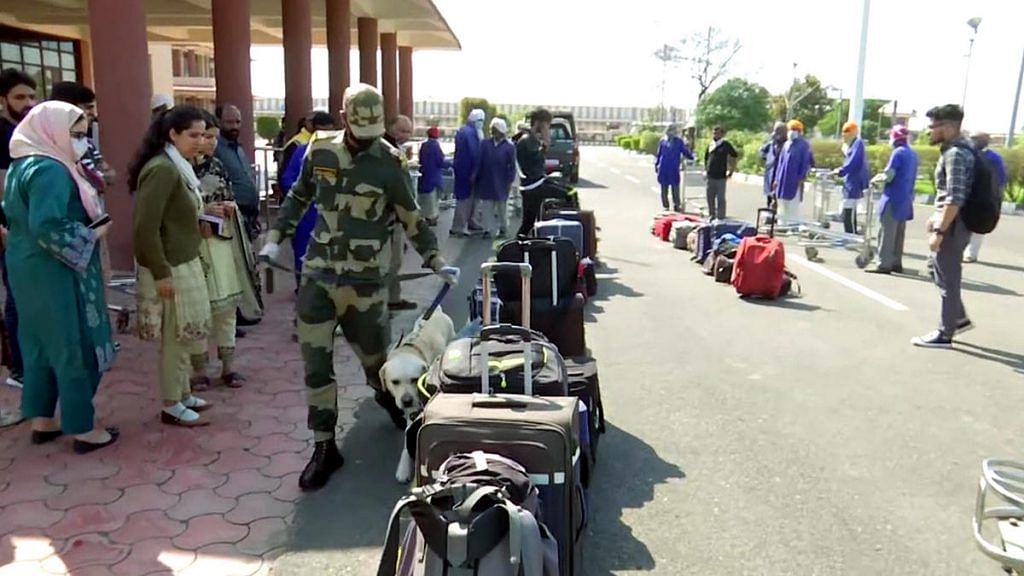Chandigarh: Punjab’s first confirmed coronavirus fatality, 70-year-old Banga resident Baldev Singh, who took ill after a visit to Italy and Germany, could be the state’s “super-spreader”. Health officials in the state suspect the two others he travelled with, including a religious leader, may also have widely transmitted the disease.
“Super spreader” is the term used for a Covid-19 patient who ends up infecting a large number of people. The term was used widely for Patient-31 in South Korea, a 61-year-old woman who attended church while infected. The number of patients in South Korea reportedly showed a sudden surge after the event.
Out of the 33 coronavirus patients in Punjab, 23 are directly or indirectly related to Baldev Singh, who died on 18 March, and his two fellow travellers. After returning from abroad in the first week of March, Baldev Singh and the duo defied the authorities’ self-quarantine advisory and socialised heavily within and outside their villages.
A massive search is now on to trace all those who came in contact with the trio from the time they returned to India until they were tested positive.
Also Read: One coronavirus patient infects 1.7 people in India, much lower than in China, Italy: Study
A big challenge
Punjab’s battle against coronavirus has found a big challenge in its vast population of NRIs and others who are known to travel abroad frequently.
An estimated 97,000 people have arrived in Punjab since early January, with more than 30,000 asked to self-quarantine, Chief Minister Amarinder Singh said in a press statement Tuesday.
“While all these people were thermally screened at the airports where they landed, it is now becoming evidently clear that thermal screening is not enough to identify a positive patient,” said a senior government doctor who is part of the state team handling the crisis.
“The patient can remain asymptomatic through the entire period of carrying the virus. Tracking these people who have returned from abroad including NRIs is keeping us on our toes virtually 24/7.”
Of the 97,000 people, only eight were reported symptomatic. Baldev and the duo were asymptomatic.
Tracking NRIs
Last week, the Punjab government made it mandatory for people who have arrived in the state over the past one month to self-report to health officials.
The government also launched an app – Cova- largely to target the NRIs who had returned to Punjab and not informed the authorities. Apart from giving general information about the disease, the app prompts users who have returned from a foreign trip to inform authorities.
Health officials are also trying to trace 144 people who landed in Punjab in the past months but allegedly gave the wrong addresses at airports.
“All these people had already been screened at the airport in Delhi,” Punjab health minister Balbir Singh Sidhu said on 18 March, adding that the government of India has been sharing reports of passengers with international travel with states.
“While those found symptomatic are admitted in hospital and kept in isolation, the lists of asymptomatic passengers are shared with the states concerned. As a matter of precaution, the Punjab government contacts these passengers to re-verify their history and medical condition,” he added.
Out of over 7,000 patients whose contact details were shared by government of India, he said, 144 people could not be traced.
‘Super-spreaders’
A kirtani-cum-preacher, Baldev, accompanied by two men from his neighbouring village, visited Italy and Germany to attend religious congregations last month.
The three returned to India on 7 March. Despite being told to stay indoors at the airport, they continued to roam around in their villages. The two who accompanied Baldev on the 16-day trip have also tested positive, along with their family members. Fourteen members of Baldev Singh’s family have also tested positive.
Despite beginning to display symptoms, Baldev Singh attended the famous Hola mohalla festival at Anandpur Sahib between 10 and 12 March where thousands of pilgrims across the state gather every year for three days.
Baldev also visited people’s homes to offer sermons, with videos of some such visits now going viral.
Herculean task
Officials in the Punjab government say they have identified 150 people the trio was in touch with after their arrival. “We have sealed almost 15 villages from where people used to visit the dera chief who accompanied Baldev Singh on this trip and is now a coronavirus patient,” said Jalandhar divisional commissioner Rahul Tewari.
Announcements and requests are being made across these villages asking people to inform officials about those contacted by the trio after their return. The numbers, it is feared, could be in several hundreds.
In light of Baldev Singh’s behaviour, Punjab Chief Minister Captain Amarinder Singh asked state police Tuesday to take strict legal action against those violating home-quarantine orders.
Also Read: Modi’s poorly planned lockdown won’t save us from coronavirus, but will kill economy
